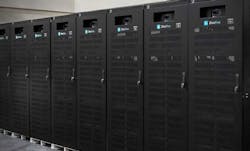Corscale Will Use Nickel-Zinc Batteries in New Data Center Campus
Data center developer Corscale will use ZincFive nickel-zinc battery technology at its new data center campus in Northern Virginia, and plans to standardize the technology across the company’s data center portfolio.
The announcement reflects how the growing focus on sustainability is prompting data center operators to consider new approaches to mission-critical infrastructure. The market for data center uninterruptible power supply (UPS) systems has historically been dominated by valve-regulated lead acid batteries (VRLA). In recent years the industry has begun adopting lithium-ion batteries, which are commonplace in mobile devices like smartphones and laptop computers.
Corscale said it sees the use of nickel-zinc in its uninterruptible power supply (UPS) systems as a step ahead in battery technology, noting its lower carbon footprint.
“For Corscale, circularity and sustainability are core to our development philosophy,” said Nic Bustamante, SVP Data Center Development at Corscale. “ZincFive’s nickel-zinc battery energy storage solution provides us with a better form factor, minimizes our maintenance schedule, allows us to deploy pre-commissioned capacity faster, offers a lower total cost of ownership, eliminates thermal runaway concerns, and is fully recyclable – something VRLA and Lithium-ion cannot match.
“When you look at the detrimental impact on the environment that lead, lithium, and cobalt pose end of life, you realize that nickel-zinc recyclability provides long-term benefits beyond the data center,” Bustamante added.
New Projects Are Early Adopters
Corscale is a new data center development platform created by the Patrinely Group together with its capital partner, USAA Real Estate. The company’s first project is Gainesville Crossing, a 300-megawatt development in Prince William County that will feature five data centers optimized for hyperscale clients.
The Gainesville project is the first of two campuses planned for Northern Virginia, to be followed by a 72-megawatt data center in the Kincora development in Sterling, just a short fiber run from Data Center Alley in Ashburn. Corscale also is acquiring land in other leading markets.
As a new platform in a crowded and highly-competitive market, Corscale has the opportunity to use technology to differentiate itself. Sustainability is a priority for the hyperscale operators that are the largest customers in Northern Virginia.
Corscale will be one of the first data center operators to use nickel-zinc batteries in production. Wyoming Hyperscale White Box also plans to use ZincFive UPS systems in a new campus it is creating in Aspen, Wyoming. Both companies say they expect to bring new capacity online late this year.
These new projects offer an opportunity for ZincFive, which develops nickel-zinc systems for IT and intelligent transportation systems. The company has been seeking a foothold for its technology in the data center industry.
“We have been working with Nic and the team at Corscale to deploy our BC Series UPS battery cabinets at their Gainesville Crossing data center,” said ZincFive CEO and Co-Founder Tim Hysell. “We look forward to helping Corscale standardize this technology across their data center portfolio, advancing our shared commitment to reducing carbon footprint and operating costs without sacrificing safety or performance.”
New Battery Players Target Data Centers
Although many data centers use lead-acid batteries, it doesn’t mean they love them. Maintenance is a particular headache, as batteries must be monitored and replaced as they fail. That has driven adoption of lithium-ion UPS systems, a longer lifetime, reduced weight and footprint, and less rigid cooling requirements.
Nickel-zinc battery systems have been around for more than 100 years, and Thomas Edison received a patent for a rechargeable nickel-zinc battery system in 1901. ZincFive says its chemistry performs well in high-drain applications because of the higher energy-to-mass and power-to-mass ratios and are ideal for Megawatt (MW) class UPS inverters found in today’s hyperscale data center environments. Nickel-zinc is non-flammable and exhibits no thermal runaway, which could address safety concerns about lithium-ion, When improperly managed or stored, a lithium-ion battery can reach a “thermal runaway” state more easily than other types of batteries, but these systems have now been in use at data centers for about 6 years using advanced monitoring and management systems.
A potential challenge for lithium-ion over the long term is availability. The rapid growth of the market for electric vehicles is driving demand for lithium-ion batteries, and could test production capacity. Consulting firm McKinsey expects annual demand for lithium to rise from 500,000 metric tons in 2021 to 3 to 4 million metric tons by 2030 – but adds that it believes the lithium industry will be able to provide enough product to supply the soaring demand for lithium-ion batteries.
Nickel-zinc isn’t the only new battery technology getting a look from large data center companies. Natron Energy offers UPS systems using sodium-ion battery technology, which the company says offers the potential to pack more capacity in a smaller footprint, as well as faster recharging. Cabinet-mounted energy storage from Natron is part of software-defined power technology system from Cato (formerly VPS) that is being tested by Equinix in its Co-Innovation Facility in Ashburn, Virginia.
Sustainability is a key emphasis for Corscale. “We can do some really unique things to on the energy side, whether it’s actual energy procurement or infrastructure development,” Bustamante recently told DCF. “We can marry up some really creative things.”
Corscale recently announced a partnership with carbon management platform nZero to reduce the company’s Scope 1, 2, and 3 emissions. Corscale will use the platform to track emissions data from across its supply chain to better understand the benefits of working with ZincFive’s lighter weight nickel-zinc technology on transportation fuel consumption and CO2 emissions.
About the Author


